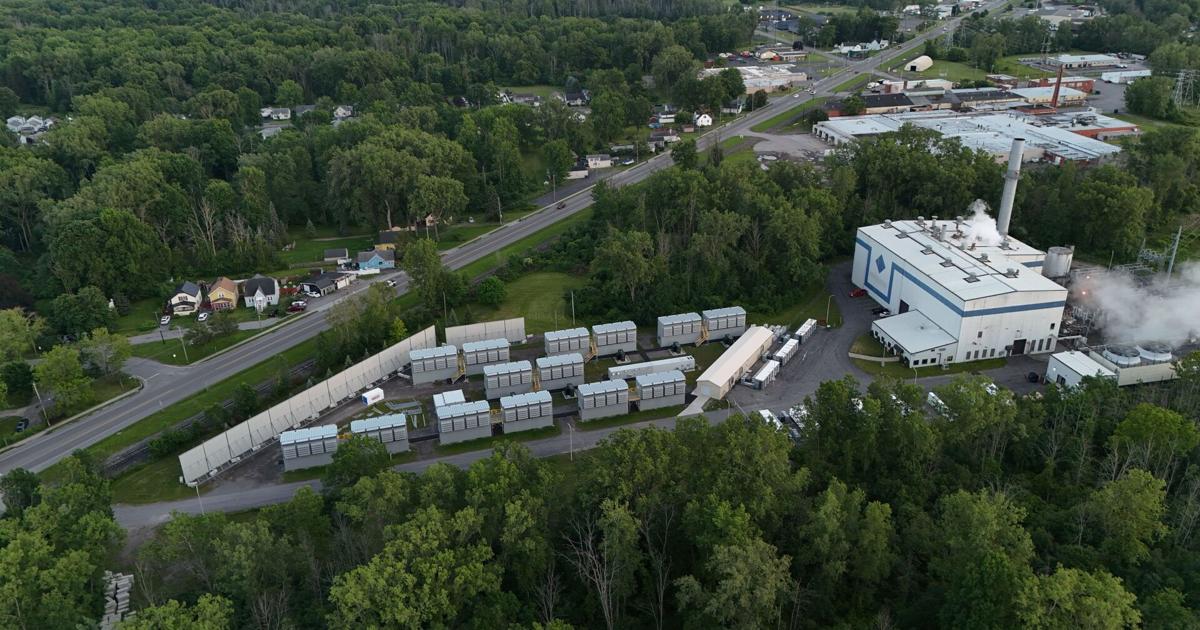News
Din of crypto mining irks North Tonawanda residents

An aerial view of the Digihost crypto mining facility on Erie Avenue in North Tonawanda.
Derek Gee, Buffalo News
The noise keeps people up at night. It forces them to close their windows on hot days, causes some to abandon their backyards in favor of the slightly quieter indoors and even changes their dog’s behaviors.
It’s inconsistent, often gets louder at night, leaves neighbors on edge and, according to experts, is likely detrimental to their health and well-being.
The noise reverberating around neighborhoods of North Tonawanda comes from Digihost, a blockchain technology company that mines cryptocurrency. It’s likely the noise comes from large fans running to cool down bitcoin-mining computers in the company’s buildings on the Erie Avenue property.
“It grates on you,” said Fairmont Avenue resident Mark Polito. “It’s like fingernails on a chalkboard … everyone’s got lawnmowers, eventually they shut off. This is constant; it’s 24/7, it does not turn off.”
People are also reading…
Mark Polito is frustrated by the constant noise from the Digihost cryptomining facility he can hear from his home on Fairmont Avenue in North Tonawanda.
Derek Gee, Buffalo News
North Tonawanda residents living around the Digihost facility said they can hear a humming noise coming from the property at nearly every hour of the day. At times, the noise seems to get louder, rising to levels akin to a jet plane running its engines right outside their front doors, community members told The Buffalo News.
“I hear it during the day before I go to work and then when I come home from work,” said Sherwood Avenue resident Karen Hance. “I hear it when I’m trying to go to sleep. I lay there and I can’t sleep because of the sound.”
Karen Hance, who moved to her home on Sherwood Avenue in North Tonwanda 15 years ago, says loud noise from the nearby Digihost crypto mining facility is ruining her quality of life.
Derek Gee/Buffalo News
On the afternoon of June 7, the facility’s humming could be heard above the patter of light rain on Polito’s back porch about a half-mile away from the Digihost property. Sitting in Kevin O’Connor’s open garage on Remington Drive less than 2,000 feet from Digihost, any lull in conversation gave reminder of the facility’s presence with the dull thrum audible over the Friday afternoon rainfall. Late Tuesday evening, the noise was much more pronounced − an obvious din that seemed to bounce off homes on Remington Drive and reverberate along Sherwood Avenue.
The noise from the Digihost facility has been polluting the North Tonawanda community for more than two years − the plant is estimated to have begun operations in February 2022.
Since then, residents said the city has done little, despite countless complaints, to enforce its noise ordinance against Digihost and give relief to those living around the facility.
Kevin O’Connor built his home on Remington Drive in North Tonawanda 38 years ago. Now loud noise from the Digihost crypto mining facility has him questioning whether he will stay.
Derek Gee/Buffalo News
The noise ordinance is supposed to protect residents and promote the “public health, comfort, convenience, safety, welfare and prosperity and the peace and quiet” of North Tonawanda.
City officials said they don’t have the equipment to enforce the noise ordinance, which Digihost may have violated, according to decibel level readings taken by the police department in May.
“The equipment that would be admissible in court is expensive and does require training,” said North Tonawanda city attorney Edward Zebulske.
The lack of any effective action to dampen or quiet the noise coming from the Digihost facility means nearby North Tonawanda residents are likely being subjected to noise pollution that could be harming their health.
“There are well-documented health impacts of noise pollution,” said Les Blomberg, director of the Noise Pollution Clearinghouse, a nonprofit dedicated to raising awareness about noise pollution. “There are cardiovascular effects to noise pollution; it triggers our fight or flight response, elevates our stress levels and causes sleep interference.”
“This company is making money,” Blomberg continued, “and they’re making money by disturbing the health and well-being of their neighbors.”
Digihost did not respond to multiple requests for comment from The Buffalo News.
City officials frustrated
The city’s inaction seems to frustrate even North Tonawanda Common Council members, many of whom weren’t on the council when the city approved the project in 2021.
“I live almost two miles away and it sounds like it’s in my backyard,” said Alderman at Large Joseph Lavey Jr. during a May 14 meeting. “When I go outside to get a cup of coffee to get some peace and quiet − you don’t get that anymore.”
Digihost’s noise could be considered surprising: In an August 2021 Common Council meeting, the company’s CEO, Michel Amar, gave a presentation outlining its objectives and priorities around being a friendly operation in North Tonawanda.
“We have servers, they are isolated in a brand new beautiful container and soundproof − you won’t hear anything on the street outside the fence of the property,” Amar said during the 2021 meeting.
On one slide in the presentation emblazoned in bold, capitalized letters was the statement: “No noise will be heard anywhere outside the premises.”
“They (Digihost) haven’t even come close to meeting the promises they made three years ago,” said Council President Frank DiBernardo during the May 14 meeting. “Right now, we’ve got to figure out how we can shut them down, quiet them up, legally, without exposing us to a big liability.”
North Tonawanda Mayor Austin Tylec told The News that Digihost has applied for a permit to build an acoustic barrier on the property, likely to prevent some of the noise from reaching neighbors’ homes. The wall may be similar to a wall already on the property, which residents said has done little to dampen the sound of the facility.
The company may also be doing “equipment updates over the next few weeks,” Tylec said, “which they claim will reduce the noise.”
But those claims don’t comfort residents who said they are tired of empty promises from Digihost and the city to reduce the noise from the facility.
“No one’s addressing it,” said Deborah Gondek, a North Tonawanda resident who has fought against the Digihost operation since its inception. “They just keep passing the buck and they set the city up for residents to bear the brunt of it, which is disappointing, to said the least.”
Deborah Gondek has been organizing opposition to the Digihost cryptomining facility in North Tonawanda.
Derek Gee, Buffalo News
Expert: City should update noise law
Tylec and Zebulske said the city cannot legally force Digihost to quiet down because it doesn’t have trained staff or the proper equipment to enforce its noise ordinance.
“Can you imagine the cops said, ‘we can’t enforce our speed limits because we don’t have any radar guns and we don’t know how to use them?’ ” Blomberg said. “If you’ve got a law on the books, you should be able to enforce it.”
Blomberg, an acoustics expert based in Vermont, has trained police departments and city officials on how to enforce their noise ordinances. He has also helped cities rewrite their noise ordinances to ensure they are enforceable, he said.
The city should either hire a professional to take decibel readings of the noise coming from the Digihost facility, or train its police officers and buy the proper equipment, Blomberg suggested.
Blomberg said certified sound level meters can cost between $250 and $500, and a calibrator necessary to ensure the equipment is working properly costs another $500. Training that Blomberg conducts to ensure police officers know how to properly use the equipment could cost about $5,000 for eight to nine officers, he added.
Additionally, Blomberg said the city should update its noise ordinance “so that the decibel level is the tool of last resort.”
The current noise ordinance focuses on protection from “unreasonable noise.” Blomberg noted that reasonableness is something people can disagree on.
Instead, the law should focus on ensuring residents are protected from “plainly audible noise” that can be heard on their property, he said.
An aerial view of the residential neighborhood in North Tonawanda just north of the Digihost cryptomining facility. Residents say the city has done little, despite countless complaints, to enforce its noise ordinance against Digihost.
Derek Gee photos, Buffalo News
Noise pollution can impact health
Reducing the noise from the Digihost facility could be vital for protecting the health of the neighboring community, said Erica Walker, an assistant professor of epidemiology at Brown University and founder of the Community Noise Lab.
The noise coming from the Digihost facility isn’t so loud that it’s killing the hearing of nearby residents. Instead, it’s noise that residents said is annoying, disturbs their sleep and often penetrates through the walls and windows of their homes.
Such noise triggers the body’s fight-or-flight response, Walker said, which is a stress response.
“That kind of stimulation can lead to a bunch of risk factors in the long run that can lead to the manifestation of pretty serious cardiovascular and mental health-related outcomes,” she said.
Examples of those outcomes include anxiety, depression, schizophrenia, inability to regulate one’s immune response, cardiovascular-related mortality, hypertension and strokes, Walker said.
Peter James, an associate professor and director of the University of California at Davis Center for Occupational and Environmental Health, echoed Walker’s concerns.
“If you have this chronic disturbance, it can lead to downstream consequences,” James said. “In an ideal world, if we really took noise seriously as a health threat I think we’d have a more systematic way to measure it in our communities.”
An aerial view of the residential neighborhood in North Tonawnada just north of the Digihost crypto mining facility, which can be seen poking above the treetops at top center.
Derek Gee/Buffalo News
Residents consider lawsuit
The North Tonawanda Police Department took decibel readings around the Digihost facility in May, according to Tylec, and some of those readings exceeded the city’s noise ordinance, he said.
But without the proper equipment, staff trained on the equipment and a comprehensive sound monitoring plan, the city fears that any action it could take would be met with a legal challenge from the crypto mining company.
“The best thing to do is to just try and work with them as best we can; try and make them good neighbors for all the residents here,” Tylec said.
The phrase “good neighbors” is one that residents have heard Tylec say countless times over the years while the noise pollution from Digihost has never ceased.
“They’re afraid of a lawsuit from that company,” said Remington Drive resident O’Connor. “But they don’t seem to be afraid of a class-action suit from the neighborhood here for a failure to protect us from a nuisance. That’s a possibility.”
Reach climate and environment reporter Mackenzie Shuman at mshuman@buffnews.com or 716-849-4018.
Get local news delivered to your inbox!
Subscribe to our Daily Headlines newsletter.
News
How Ether Spot ETF Approval Could Impact Crypto Prices: CNBC Crypto World

ShareShare article via FacebookShare article via TwitterShare article via LinkedInShare article via email
CNBC Crypto World features the latest news and daily trading updates from the digital currency markets and gives viewers a glimpse of what’s to come with high-profile interviews, explainers and unique stories from the ever-changing cryptocurrency industry. On today’s show, Ledn Chief Investment Officer John Glover weighs in on what’s driving cryptocurrency prices right now and how the potential approval of spot ether ETFs could impact markets.
News
Miners’ ‘Capitulation’ Signals Bitcoin Price May Have Bottomed Out: CryptoQuant

According to CryptoQuant, blockchain data shows signs that the Bitcoin mining industry is “capitulating,” a likely precursor to Bitcoin hitting a local price bottom before reaching new highs.
CryptoQuant analyzed metrics for miners, who are responsible for securing the Bitcoin network in exchange for newly minted BTC. As outlined in the market intelligence platform’s Wednesday report, multiple signs of capitulation have emerged over the past month, during which Bitcoin’s price has fallen 13% from $68,791 to $59,603.
One such sign includes a significant drop in Bitcoin’s hash rate, the total computing power that backs Bitcoin. After hitting a record high of 623 exashashes per second (EH/s) on April 27, the hash rate has fallen 7.7% to 576 EH/s, its lowest level in four months.
“Historically, extreme hash rate drawdowns have been associated with price bottoms,” CryptoQuant wrote. In particular, the 7.7% drawdown is reminiscent of an equivalent hash rate drawdown in December 2022, when Bitcoin’s price bottomed at $16,000 before rallying over 300% over the next 15 months.
This latest hash rate drop follows Bitcoin’s fourth cyclical “halving” event in April, which cut the number of coins paid out to miners in half. According to CryptoQuant’s Miner Profit/Loss Sustainability Indicator, this has left miners “mostly extremely underpaid” since April 20, forcing many to shut down mining machines that have now become unprofitable.
CrypotoQuant said that miners faced a 63% drop in daily revenue after the halving, when both Bitcoin block rewards and transaction fee revenues were much higher.
During this time, Bitcoin miners were seen moving coins from their on-chain wallets at a faster rate than usual, indicating that they may be selling their BTC reserves“Daily miner outflows reached their highest volume since May 21,” the company wrote.
Among the sales of Bitcoin miners, whales and national governmentsBitcoin’s price drop in June also hurt Bitcoin’s “hash price,” a metric of Bitcoin Miner Profitability per unit of computing power.
“Average mining revenue per hash (hash price) continues to hover near all-time lows,” CryptoQuant wrote. “Hashprice stands at $0.049 per EH/s, just above the all-time low hashprice of $0.045 reached on May 1st.”
By Ryan-Ozawa.
News
US Congressman French Hill Doubles Down on Trump’s Pro-Crypto Stance

US lawmaker French Hill has noted that Donald Trump will take a more pro-crypto approach than the current administration. The run-up to the presidential election has seen cryptocurrencies become an issue with lawmakers making huge statements ahead of the polls. Donald Trump has also been reaching out to the industry, making a pro-crypto case.
French Hill Backs Trump’s Pro-Crypto Stance
Republican Congressman French Hill has explained the type of cryptocurrency regulatory framework he believes Donald Trump could adopt in the country. In a recent interview with CNBC, French Hill said that the recently passed FIT21 bill is the type of regulatory framework the Trump administration will adopt in the sector.
#FIT21 passed the House with 71 Democratic votes, it’s exactly the kind of digital asset regulatory framework former President Trump would support if re-elected.
See more on @SquawkCNBC🔽 photo.twitter.com/ceTmU4LApU
— French Hill (@RepFrenchHill) July 3, 2024
THE FIT21 Bill It is intended to protect investors and consumers in the market by establishing clear rules and powers for the various regulators in the sector. According to Hill, Trump will adopt it because it directs the Securities and Exchange Commission (SEC) and the Commodity Futures Trading Commission (CFTC) on the specific regulatory framework needed in the market.
“… for people who are innovating and starting a crypto token, a related business, custody of those assets, how to ensure consumer protection, so I think that framework is the right approach and that’s what I’m going to recommend to the President to pass, which is that we have not passed it between now and the end of this Congress.”
He also called Trump an innovative and pro-growth president in financial matters.
Cryptocurrency is going mainstream
This election cycle saw the cryptocurrency industry taking a place in mainstream issues following broader adoption across demographics. From candidates moving toward enthusiasts to recent pro-Congress legislation, cryptocurrencies have become a rallying point for officials. The U.S. regulatory landscape has been criticized for stifling growth due to frequent SEC LawsuitsThis has led executives to push for pro-cryptocurrency laws and raise money for pro-industry candidates.
Read also: Federal Reserve Predicts “AI Will Be Deflationary” to Stimulate Economy
David is a financial news contributor with 4 years of experience in Blockchain and cryptocurrency. He is interested in learning about emerging technologies and has an eye for breaking news. Keeping up to date with trends, David has written in several niches including regulation, partnerships, cryptocurrency, stocks, NFTs, etc. Away from the financial markets, David enjoys cycling and horseback riding.
News
US Court Orders Sam Ikkurty to Pay $84 Million for Cryptocurrency Ponzi Scheme

A federal court has ordered Jafia LLC and its owner, Sam Ikkurty, to pay nearly $84 million to cryptocurrency investors after ruling that the company was operating a Ponzi scheme.
The ruling, issued by Judge Mary Rowland in the U.S. District Court for the Northern District of Illinois, follows a lawsuit filed by the Commodity Futures Trading Commission (CFTC) in 2022 after the fund collapsed.
Judge Rowland found that Ikkurty, based in Portland, Oregon, did numerous false claims on his company’s hedge funds.
These included misleading statements about his trading experience and the promise of high and stable profits. Instead, Ikkurty used funds from new investors to pay off previous investors, a hallmark of a Ponzi scheme.
The Ponzi Scheme
The court found that Ikkurty misappropriated investment funds for personal use without the knowledge of the investors. These funds were used for personal use and were reported as Fraudulent Investmentscausing significant financial losses to customers.
This non-transparent operation violated Transparency Commission regulations, which led to the imposition of a hefty fine to compensate defrauded investors and restore some public confidence in the financial system.
Judge Rowland emphasized that fraudulent activity such as this violates the law and undermines the integrity of modern financial markets. The $84 million award seeks to address the financial harm inflicted on investors and reinforce the importance of legal compliance in cryptocurrency trading.
-

 Videos9 months ago
Videos9 months agoBitcoin Price AFTER Halving REVEALED! What’s next?
-

 Bitcoin8 months ago
Bitcoin8 months agoBitcoin Could Test Record Highs Next Week in ETF Flows, Says Analyst; Coinbase appears in the update
-

 Videos9 months ago
Videos9 months agoAre cryptocurrencies in trouble? Bitcoin Insider Reveals “What’s Next?”
-

 Videos9 months ago
Videos9 months agoCryptocurrency Crash Caused by THIS…
-

 Videos8 months ago
Videos8 months agoThe REAL reason why cryptocurrency is going up!
-

 Altcoin8 months ago
Altcoin8 months agoThe best Altcoins to buy before they rise
-

 Videos9 months ago
Videos9 months agoBlackRock Will Send Bitcoin to $116,000 in the Next 51 Days (XRP News)
-

 Videos9 months ago
Videos9 months agoDonald Trump: I like Bitcoin now! Joe Biden HATES cryptocurrencies.
-

 Videos8 months ago
Videos8 months agoSolana Cryptocurrencies: the future WILL SHOCK you | What comes next?
-

 News9 months ago
News9 months agoTON, AKT, AR expect increases of 15%+ as the market stabilizes
-

 Videos8 months ago
Videos8 months agoBitcoin Whale REVEALS: The 5 Best Coins to Make You a Millionaire!
-

 Videos8 months ago
Videos8 months agoBREAKING NEWS: The 19 best cryptocurrencies ready to skyrocket!












